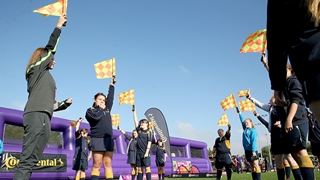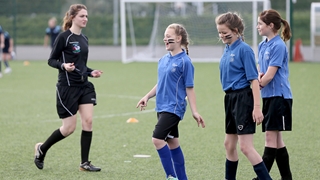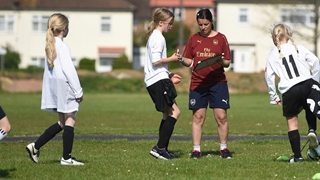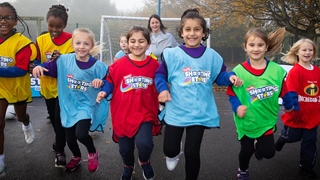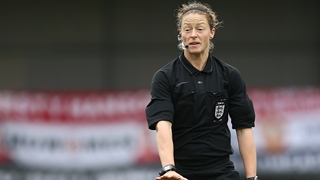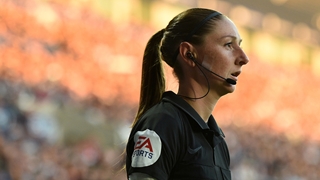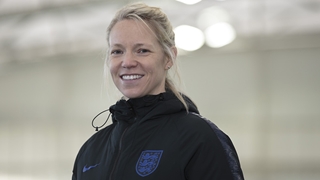
In 2017, I was recruited as the FA’s women's refereeing manager with two main objectives, to increase the number of female referees across both the women’s and men’s football pyramids and to raise the standard of the referees operating in the rapidly evolving women’s game.
The overriding ambition was for the FA to become a world leader in women’s refereeing.
My journey into the world of refereeing originated as a player. I played for my home club Street FC, and like anyone at a local club you get roped into additional roles to help out.
On Saturday mornings, I began refereeing the U14s girls’ team and having little knowledge of what I was doing, I chose to register and complete the basic referee’s course with my County FA.
I enjoyed the course and started refereeing regularly on both men’s and women’s grassroots game. I got the ‘bug’, stopped playing, applied for promotion and progressed through the Somerset FA system quickly, coming through the men’s pathway into the semi-professional game and onto the FA Women’s Super League.
It was a great learning opportunity and gave me the best possible grounding for the job I have now. I experienced first-hand the challenges that exist for female referees and how difficult it was to navigate the pathway.
Refereeing became my profession when I became the referee development officer at Somerset FA, where my role was to develop and implement a training strategy to support grassroots referees achieve their personal ambitions and fulfill the needs of our affiliated leagues.
Back in 2017, we needed to drive change. Change needed a strategy and a long-term vision. It was going to be complex. Refereeing had not quite managed to keep up with the rapid acceleration of growth of the women’s game.
Cue a whirlwind four seasons but some clear progress. The headline figure is that the number of referees has increased by 72 per cent to 2146. But it’s the story behind these figures that makes me particularly proud.
Over the last four seasons we’ve focused our attentions at the elite and grassroots level of the game. Our work at grassroots was fundamentally about recruitment, targeting our existing pool of players [across junior and adult age groups] as the core target audience and actively ensuring that there are
opportunities for all people from all backgrounds to get involved in the game as referees.
We needed to change perceptions, a phrase you will be familiar with across our work in the women’s game. We had previously shied away from promoting what's good about female refereeing. We changed our mindset, actively promoting refereeing as a hobby, a part-time job, for fitness, fun, friendships, learning, as a potential career option and as a gateway to some incredible experiences.
Crucial to our recruitment drive has been collaborative work between the County FAs and our women’s and girls’ grassroots clubs and leagues across the country. County FA development staff working within their girls’ clubs and leagues to deliver referee development to their players, not just raising the
profile of women’s refereeing and the opportunities it encompasses but also using the knowledge and skills required as referee to develop them as players.
We needed to treat refereeing in the women’s game as different to the men’s. The game is played differently, the players behave differently, and the environment is different. The creation of the newly created women’s game referee pathway is a gamechanger for our long-term progress.
Established at the beginning of the 2019-20 season, it provides referees with a clear structure uniquely through the girls’ and women’s game from grassroots through to a FIFA match official.
We want this pathway to challenge them, to develop them as people and for the few who want to go all the way, give them the opportunity to be the best in the world.
Role modelling is key to the pathway’s success, championing those from all backgrounds who succeed as an inspiration for others to follow suit. We currently have four female referees [Rebecca Welch, Abi Byrne, Stacey Pearson, Kirsty Dowle] and five assistant referees [Sian Massey-Ellis, Helen Byrne, Natalie Aspinall, Lisa Rashid, Melissa Burgin] on the FIFA list of match officials.
They are our representatives on the world stage. We want referees of all ages up and down the country to know who they are, understand their journey and have the ambition to follow in their footsteps. What is so pleasing is our group of elite referees understand the role they can play inspiring the next generation and as a result they are so generous with their time.
Specifically, at the elite end of the women’s pyramid, we needed to invest time and resource to educate and develop our senior match officials operating within the Barclays FA WSL and FA Women’s Championship. The creation of our senior development group has provided all Barclays FA WSL and FA Women’s Championship match officials with personal development – bespoke to the women’s game - and an individual specialist coach who offers one-to-one support prior, during and post-matchdays.
I know from my time as a referee that one poor decision can sometimes eat away at a referee for days after a match. This support structure allows constructive one-to-one discussion around individual decisions and crucially it encourages self-reflection on performances, which is such an important part of ensuring match officials are continuously learning and developing.
Fitness requirements have previously been a barrier for female match officials and restricted their progression. We have created a strong partnership with PGMOL [Professional Game Match Officials] who provide bespoke support, education and training programmes to ensure the highest levels of fitness and minimise the risk of injury.
The Barclays FA WSL now implements the same forensic match evaluation system that is used by PGMOL in the Premier League, driving higher standards. It provides video analysis of every decision and non-decision made by officials and can identify the common trends to allow us to tailor professional referee development across the women’s game.
We've seen over the course of this season that 98.3 per cent of decisions have been correct. When you consider on average match officials make 340 decisions in 90 minutes, that’s a big proportion of correct decisions and shows we are operating at a high standard but with room for further improvement. The work we have done heavily focuses on increasing development opportunities for female match officials.
Our intentions were best demonstrated by two back-to-back weekends in March of this year. The first weekend we welcomed over 100 female referees from all backgrounds for our annual grassroots development day at St George’s Park.
Referees from as young as 14 spent the day with FA staff, tutors and senior referees, providing referee education but most importantly giving them an opportunity to network, engage and share their experiences with their female colleagues from across the country.
The following weekend we hosted the senior women’s training camp, which is one of two annual camps specifically for those working in the elite game. It was attended by all female referees operating within the Barclays FA Women’s Super League and FA Women’s Championship.
The weekend included fitness and nutrition sessions, as well as bespoke professional development from the findings of the evaluation system. The camaraderie at both events show that we have started to build a real community at both ends of the pyramid, where everyone looks out for each other and learns together. Many of our younger referees have adopted the hashtag #GirlsThatRef to share their experiences on a weekend and seeing their pride in being a referee is something I find so inspiring.
Our work over the last four seasons has built strong foundations and I believe there’s never been a better time to be a referee, especially a female referee. The opportunities and support available is the best it has ever been but as the game continues to grow, we are under no illusions that we need to keep pace and ensure we are giving our referees the best possible support.
Are we where we want to be? No, this is an ever-evolving, long-term journey and the 2020-24 strategy will reveal how we intend to drive higher standards and grow our numbers, increasing opportunities for female referees from all backgrounds.
Our success over the last four years wouldn't have been possible without the dedication of our volunteer referee developer workforce. Our County FA referee development officers have adopted women’s refereeing as a priority and have been central to our journey - we owe them a huge debt of gratitude.
And thank you to the 2146 female referees who commit week in, week out to support football matches across the country, you are at the heart of every decision we have made and will continue make in the future.
Read some of our case studies and find out more about refereeing from the Gameplan for Growth.
INSPIRED? START YOUR REFEREEING CAREER NOW!

